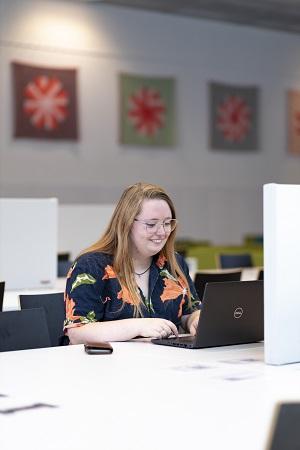The story behind the student
What is it like to be studying at Tilburg University as a student with a physical disability? Janne knows. She is studying Organization Studies and Health Humanities and is a member of the focus group for students with a disability. “Tilburg University pays attention to the needs of people with a disability and there are many support facilities,” she says. “But there is also room for improvement.”

The muscles on the right-hand side of Janne’s body are underdeveloped. She was born that way. Because her right-hand side is less strong, she tends to overcompensate with her left-hand side. Janne: “The conditions is called right-sided hemiplegia. In day-to-day life, I am generally a bit slower; for example, I don’t walk very fast. And it impacts my reaction time. I am also frequently tired because exercise costs me more energy. In addition, I have spasticity. When I am stressed or nervous or if something gives me a fright, I involuntarily flap my arms.” Thanks to much and long-term physiotherapy, ergotherapy, and speech therapy, the support of her parents, and her own perseverance, Janne learned to walk and talk well and to ride a bike.
Being open
She is always open about her condition. Janne: “I think that’s important. Since my disability is not visible, people usually aren’t aware of it. That is why I often tell them. I am who I am and I fully accept myself. If I had to hide my disability, that would only result in more stress and fatigue.”
Extra facilities
During the application procedure at Tilburg University, students are asked whether they have a physical or mental disability and whether they need support facilities. Janne: “I told my story on the application form. My diagnosis, that I need extra time to do exams, that I want to work on a laptop and that I prefer to work in small room because it helps me concentrate. After my application, I had an interview with an education coordinator. There was room to tell my story and to specify what I need. That process went really smoothly for me. That showed that it is a normal thing for Tilburg University to have students with a disability studying here.”
Focus group
Within Tilburg University, an ‘Inclusive Education’ working group is active. Janne is a member of the student focus group as part of this initiative. “This group is such a bonus,” says Janne. “It shows that Tilburg University takes our interests to heart. It makes me feel personally heard. I do think that we could contribute more, for instance, if we are involved plans for new buildings at an earlier stage. We look at spaces differently and would like to give advice on small changes to make buildings more inclusive and even better wheelchair-accessible.”
In pratice
Across the board, Janne is pleased with the support offered by the university. “The service side of things is well organized. I sit my tests with a small group op students in a separate room and there is always a laptop waiting for me.” Still, she sees room for improvement. “If there is a midterm, the availability of facilities depends on the group size. If the group is large, facilities are usually available. If the group is small, it is often not possible to do the exam in a separate room.”
It is also Janne’s experience that not all instructors are aware of or understand her disability. “On the one hand, this is not really a surprise to me because my disability is not visible. But it is kind of annoying if I have to explain time and again why I cannot sit my exam in a buzzing lecture hall. And when I flapped my arms during a lecture, I noticed that the lecturer gave me a funny look and did not know how do handle the situation. Even though it is all in my file.”
Everyone counts
Being a truly inclusive university first and foremost requires more awareness, Janne concludes. “Therefore I would say to lecturers: please read the files so you know the stories behind your students. My message to students is: not everyone is the same; we are also part of this community. I would like to call on other students with a disability to share their experiences with lecturers and fellow students. Openness contributes to more understanding. If we all contribute and share our stories, we create a more inclusive university as well as a society in which everyone participates and everyone counts.”
Focus group for students with a functional disability
The ‘Inclusive Education’ focus group is part of the working group of the same name. The aim of the working group is implementing the objectives of Article 24 of the Convention on the Rights of Persons with Disabilities. Besides the government, educational organizations are also responsible for inclusive education. Students with various functional disabilities are members of this focus group. The working group takes their experiences, any obstacles they encounter, and their suggestions to promote more inclusive education into account. In addition, the focus group elaborates ideas that promote inclusive education.
Do you have a disability and does it affect your studies? Or are you enthusiastic and do you want to join the focus group? We look forward to meeting you! Please contact a.i.mosterd@tilburguniversity.edu.
